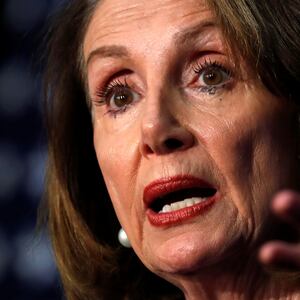No sooner did Nancy Pelosi, in an interview with The Washington Post that ran online on Monday afternoon, pour cold water on the idea of impeaching the president than people set to somberly examining what she might actually mean.
In fact, she essentially poured from the same pitcher that she has before, but not so overtly: she says -- as she has said on background, or her allies have said -- that she simply doesn’t think that it’s wise for the Democrats to pursue impeachment of Donald Trump in such an intensely partisan atmosphere, and with the high degree of unlikelihood of the Senate mustering the required two-thirds vote to remove Trump from office, and without bipartisan support.
On the face of it, the Speaker of the House was making sound points. At the time of Richard Nixon’s in-effect impeachment, the degree of partisanship was mild compared to now and the process ended with a significant amount of bipartisan support. Like Trump, Nixon threatened the constitutional order. Unlike Trump, Nixon—a lawyer and a former House member, senator, and vice president (for eight years)—was a creature of the political system.
ADVERTISEMENT
He and his White House complained about the investigation into the Watergate break-in and related crimes, but their rhetoric was much milder. (“One year of Watergate is enough.”) Nixon did go so far as to arrange for the firing of the special prosecutor (as he was called then), but he went along meekly when he soon found himself with a new one.
Nixon, too, had a base but it wasn’t as impassioned as Trump’s, as inflamed by his rhetoric, and it didn’t have such structural backing as Fox News. And the Republican Party then was practically left wing compared to the current one. It was heavily populated by moderates, and inter-party transacting and socializing were the norm.
But: there was no bipartisanship behind the impeachment process of 1974 when it began. Democratic House Judiciary Committee Chairman Peter Rodino and his aides and allies understood that for the country to accept Nixon’s impeachment and possible expulsion from the presidency, such actions had to have bipartisan support.
Like now, the Democrats ruled the House, and at the outset the process was of their making. Rodino and his top aides plotted extensively to bring committee Republicans and Southern Democrats (they existed then in some number) around to supporting articles of impeachment, or indictment of the president.
They also had in mind the Senate, where they would conduct an in-effect trial and they’d need a two-thirds vote to convict the president and remove him from office. Rodino was privately terrified of a Nixon who’d been impeached but not convicted, a wounded lion with a lot of power still at his command.
It’s not unreasonable for Pelosi to have similar thoughts. But to insist on bipartisanship at the outset is to set a trap for her own party. The 1974 Republicans were slowly – very slowly – brought around by the cumulation of evidence, far from all of which was available at the outset.
It was an agonizing process for both sides. First, the Democrats’ most openly fervent backers of impeachment, such as California’s Jerry Waldie and Father Robert Drinan of Massachusetts, had to be sidelined. The committee majority couldn’t look too eager to drive the president from office.
Whatever they actually thought, they approached the process more in sorrow – oh, so regretfully. To be fair, at that point impeachment was an awesome prospect; it hadn’t happened for roughly a century, when Andrew Johnson was impeached by the House but when Senate conviction fell one vote short.
The cheapening of the process was yet to come in the form of the Republicans’ nakedly partisan, shakily founded impeachment of Bill Clinton in 1998. The word was in no way tossed around as loosely in 1974 as it is now. In fact, no one even knew how to do it; there was a sudden run on the bookstores of the one authoritative book on the subject.
There are other reasons to be disturbed by Pelosi’s stated position on impeaching Trump.
The Founders put the impeachment clause in the Constitution for what was to them a critically important reason: the new country was not to have a king. Therefore there had to be a way to hold a president accountable between elections. (At the time the Constitution was being written, an impeachment was taking place in the old country, as Parliament began to consider the case of Warren Hastings, the governor-general of Bengal.)
It’s reasonable to think that the Founders would have been most perturbed at the idea that the Congress wouldn’t uphold its solemn duty to act as a check on the president because it might be a nuisance, or politically disadvantageous. Of course, they didn’t anticipate political parties, and also took a dim view of “factions.”
But whatever realities they didn’t foresee (and there were several), it’s impossible to see the Founders backing off the crucial concept of checks and balances among the three branches of government, especially of the Congress keeping the president in check. (The role of the Supreme Court was much vaguer at the time.)
Those current Democrats, and there are many, who argue that it would be better to defeat Trump at the polls in 2020 than to go through a messy, Intensely partisan process – one that might even backfire on them -- are overlooking some significant points.
One problem with that argument is that since the impeachment clause was entered into the Constitution for a deeply serious reason, it would set an awful precedent to put it aside when it looked, in Pelosi’s words, “just not worth it.” (She was actually referring to Trump, but the point is the same.) Another thing the argument overlooks is that one reason to remove Trump from the presidency is that he’s a dangerous man – this would be cloaked in the appropriate terminology -- and each additional five minutes he remains in office runs additional risks.
So it’s a bit disingenuous to argue that impeachment has to be bipartisan from the outset – and one thing Nancy Pelosi is not is disingenuous. Like any good pol, she thinks on more than one level. Whether she learned from the example of her fellow Italian-American politician Rodino or figured it out for herself, she understands that the Democrats mustn’t look eager to, as it’s often put, overturn the last presidential election.
If there were to be an impeachment, she and her party, like Rodino and his, would have to be dragged into doing their solemn constitutional duty. Or appear to be. Thus, Pelosi took the only position she could – and she made a big deal about the fact that she was delivering news to her Post interviewer, Joe Heim.
He could have figured that out for himself, but she was uncharacteristically explicit, eager to make sure that he got the point. (“I’m going to give you some news right now.”)
Pelosi rarely stumbles, but she may have overdone it this time. If the evidence – from the multiple Democratic-run House committee investigations, the investigations in the Southern District of New York and the New York attorney general, as well as, of course, the report from special counsel Bob Mueller, and also from what’s taken place before our eyes -- is overwhelming that Trump has committed both crimes and impeachable offenses (they aren’t necessarily the same thing), she’ll have to walk back at least some of her dicta. She can always explain, however reluctantly, that the evidence is now so strong that the impeachment process (as opposed to its outcome) is required.
But there will remain that problem of having required that the process be bipartisan. I’m not of the camp that it’s out of the question that the present-day Republicans would ever vote to punish Trump or even to remove him from office.
For one thing, predicting is one of the most fruitless political activities. Political developments have a way of taking us by surprise; we may have guessed correctly, but we were only guessing – perhaps laced with a strong dose of intuition, but guessing, still.
For another, things are taking place now that wouldn’t have been and weren’t predicted six months ago. Cracks have been appearing within the Republican Party since before the midterm elections, when numerous candidates told the White House, “Thank you just the same; the president need not come campaign for me.” Trump been already losing two or three Senate Republicans on various votes. On most Senate roll calls, if he loses four Republicans, he loses the issue.
Trump is likely to lose the impending Senate vote on his faux emergency on the southern border (though he’s likely to prevail on a vote to override an expected veto of a negative resolution). Everyone covering Capitol Hill knows that Trump is far less popular among members of his party there than their predominant rhetoric would suggest. They’re onto him; they’ve been privately joking about or despairing over him from very early in his presidency.
I’m not arguing that a significant number of Republicans will turn on Trump, but from the available evidence and on the basis of the fluidity of politics I’m not prepared to insist that it’s impossible that that would ever occur. Politics is largely an evolutionary process; why don’t we let the impeachment issue evolve?
In the meantime, Nancy Pelosi has taken care to carve out what she hopes is a safe place for her and her party.








